Some Harriet Stephens Poems + One Of Her Stories For You
A SONG OF SPRING.
BY HARRIET STEPHENS.
Ring the joy-bells! Spring is coming,
Carolling a merry lay,
See her heralds hast'ning forward
Swiftly, to prepare her way!
Days are lengthening, warm winds blowing,
Wattle bursting into bloom,
Birds upraising songs of gladness,
All pronouncing Winter's doom.
Here she is! No, she has vanished!
Why, wherever can she be?
She was with us for a moment,
Laughing gaily, full of glee.
Ah! we must have been mistaken,
She is nowhere to be seen.
But 'tis certain she was peeping.
From among the leaflets green.
Graceful fairy, do not linger,
See, we wait with outstretched hands;
Loyal greeting we will give thee,
Bend we low at thy commands.
Ah! she's coming now in earnest.
Music echoes far and near.
Weave bright garlands, swell the chorus,
Ring the joy-bells'. Spring is here!
A SONG OF SPRING. (1906, October 31). The Sydney Mail and New South Wales Advertiser (NSW : 1871 - 1912), p. 1138. Retrieved from http://nla.gov.au/nla.news-article163685623
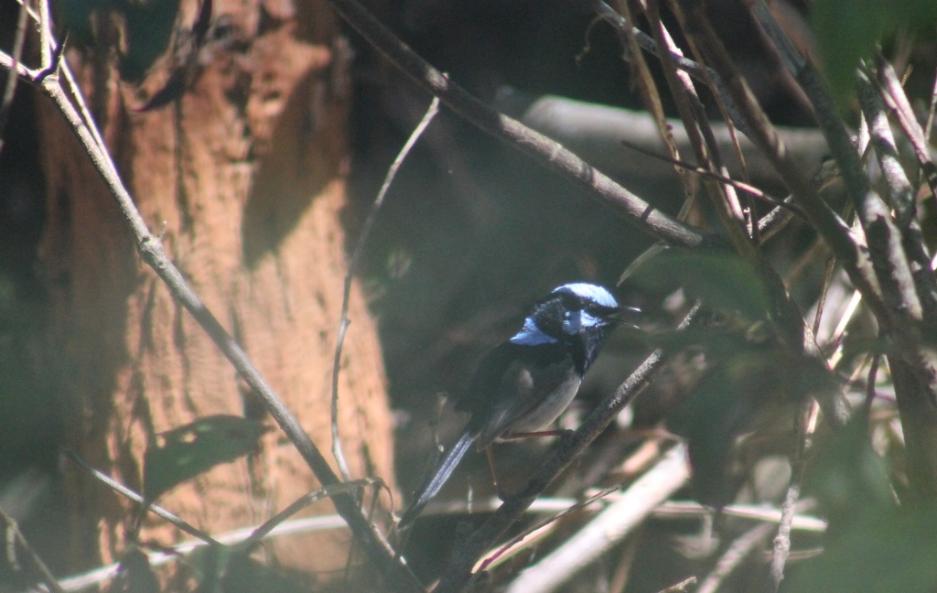
THREE CHILDREN.
BY HARRIET STEPHENS.
"The day will be dull," a small boy cried,
'See how the rain is falling!
The sky is so misty, bleak, and grey,
I wanted to go to the fields to play,
Bother the rain for coming, I say,
A weary day 'twill make it.'
'The day will be drear,' a wee maid sighed,
'Hark! how the rain is beating.
I wanted along the beach to run,
This horrid rain always spoils our fun.
Oh, dear! how I wish the day were done, .
A tiresome day 'twill make it.'
'The day will be bright,' a gay lad cried,
'Spite of the rain that's pouring.
I'll run all the errands mother may need,
I'll lie on the rug with a book, and read.
The hours like lightning away will speed,
A busy day I'll make it.'
Three children upon the hearthrug sat,
Outside the rain was fairing.
'The day has been dull,' the small boy
cried,
'The day has been drear,' the wee maid
sighed,
'The day has been bright,' the gay lad
cried.
But the day had been what each made it.
THREE CHILDREN. (1907, July 10). The Sydney Mail and New South Wales Advertiser (NSW : 1871 - 1912), p. 110. Retrieved from http://nla.gov.au/nla.news-article163661830
THE RETURN OF SPRING.
BY HARRIET STEPHENS.
SPRING, fair enchantress, to earth has
descended,
Mortals, your voices in welcome upraise!
While, from all sides, the bush-dwellers are
gath'ring.
Eager to join in an anthem of praise.
PIPING a merry-toned lilt comes the Cuckoo,
Followed by songsters from hillside and
plain;
Down in the marshes the waterside fringing,
Blithe little Reed-warblers echo the strain.
RINGING in paeans of gladness unfettered,
Out from the thicket the Bell-bird's clear
note,
Rising and falling in silvery cadence,
Like a sweet chime o'er the bush seems to
float.
IDLY, warm breezes, the leaflets caressing,
Murmur soft harmony, tuneful and low;
River and streamlet, together, contribute
Ripples of music, as onward they flow.
NOW come the Flower Spirits — dainty
Boronia,
Graceful Clematis, and Buttercup gay;
Golden- crowned Wattle is wooed by the Sun
beams,
Butterflies hover round each slender spray.
GAILY all Nature, in unison blending,
Pours forth, triumphant, the gladsome re
frain,
'Winter has vanished, his sovereignty ended,
Spring has come back to us! Joy to her
reign!'
THE RETURN OF SPRING. (1907, September 11). The Sydney Mail and New South Wales Advertiser (NSW : 1871 - 1912), p. 696. Retrieved from http://nla.gov.au/nla.news-article163658124
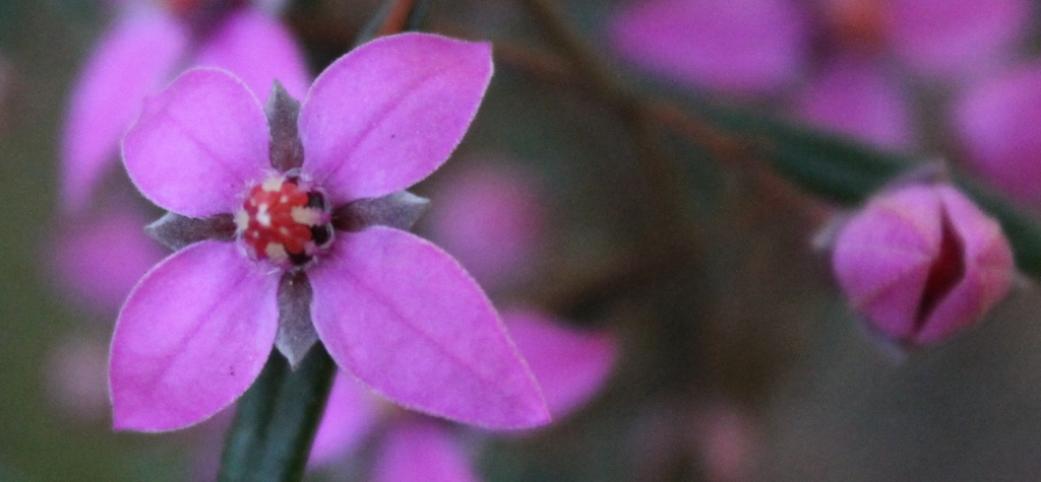
Boronia
THE HOLIDAY ELVES.
BY HARRIET STEPHENS.
Hark to the song from the rippling sea,
Down on the smooth sand curling;
List to the murmur from foam-capped waves
Over the dark rocks swirling;
Moment by moment those magic tones
Low on our ears are falling.
Haste, then, to answer them! Children come;
Hark how the Elves are calling!
Hush! 'Tis a -whisper from out the bush,
‘Mid the Acacias stealing,
Soft, neath the Myrtles; and fragrant Gums,
Fairy-like bells are -pealing;
E'en in the waterfall's crystal spray,
Down over- the cliff-side falling,
Can you not hear them, the merry sprites?
Hark how the Elves are calling!
Where shall we follow them? Children, say!
Down where the waves are dancing,
Or, where, ‘twixt Tree Ferns’ cool, spreading fronds,
Sunbeams are swiftly glancing?
Still, far off voices, in tones of glee,
Low on our ears are falling;
Come, do not linger! From bush and sea,
Holiday Elves are calling.
THE HOLIDAY ELVES. (1908, March 11). The Sydney Mail and New South Wales Advertiser (NSW : 1871 - 1912), p. 686. Retrieved from http://nla.gov.au/nla.news-article164346024
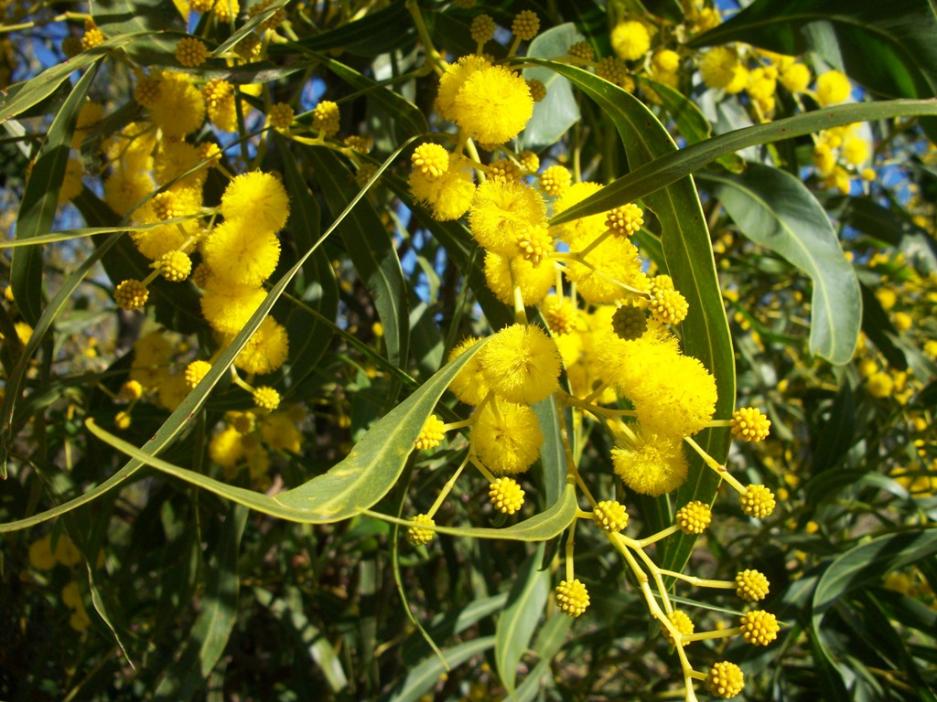
Golden Wattle, Acacia pycnantha, in flower in Pittwater
SIR DRAGONFLY.
BY HARRIET STEPHENS.
Proudly conscious of his beauty and grace, Sir Dragonfly, in gorgeous, glittering attire, was sailing and darting about above a clear little creek, which threaded Its way through a secluded gully. Meanwhile, hie wife, stationed amid a clump of rushes near by, every now and again dipped into the water, as if interested in something beneath it. This apparently harmless action of hers, however, struck terror into the heart of a Water Beetle, who had come to the surface for a breath of air. With a dismayed ejaculation, he swiftly rowed himself to the bottom of i the creek in his usual skilful fashion, which : consisted of turning on his back, and using ) his long hind legs for oars. He next proceeded to spread a report among his acquaintances, which very thoroughly disturbed their peace of mind.
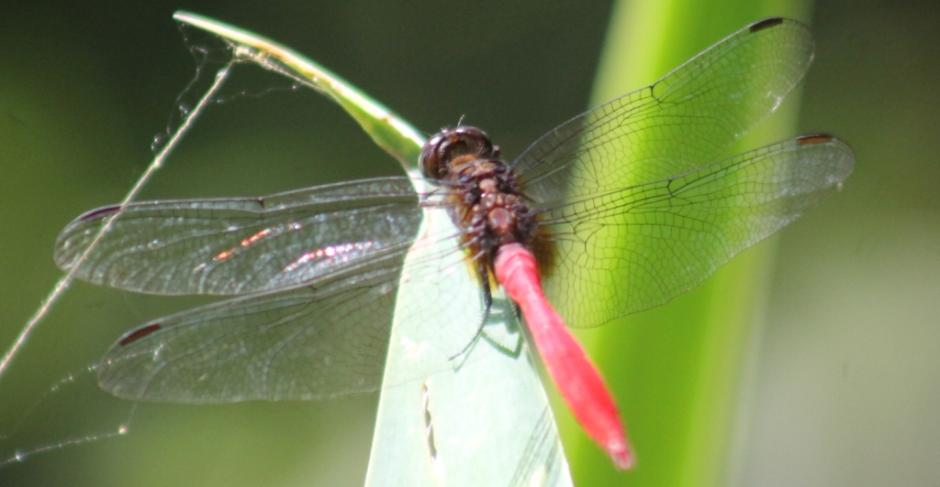
Reposing upon a leaf of one of the water plants was a cluster of tiny eggs, from which a family of young Dragonflies would emerge, and it was over these, as the Water Beetle had at once perceived, that their mother kept such careful watch. And, when the fact was made known, great was the panic among the Smaller Insects, for well they knew that they and their children would fall victims to the hungry little Dragonflies, for this thing had happened before.
As it was, the presence of Sir Dragonfly and his wife filled their Iives with terror, and now the danger would be truly appalling.
Time flew by, and brought many changes. The small strangers had come into the world, had grown up, and finally, with one exception, had gone abroad to seek their fortunes.
Sir Dragonfly and his lady had died long since, and the family was represented by the single one of their children who had chosen to stay in the old home on the banks of the creek.
A lonely life he led, for those of his own race who chanced to visit there did not stay long, preferring to be off and see something of the world, and the Water Insects, to whom tales of bygone days had been handed down, regarded him with dread, as was natural, and took every care to avoid him.
This thought made him sad, for, desiring to pass his life near the quiet creek, he had firmly resolved, whatever might have happened in the past, to do nothing which would disturb the peace of any who dwelt beneath the streamlet.
Still, seeing that he had no such scruples concerning those others who hovered within his reach through the realms of air, it was little wonder that he found it hard to make the Water Insects believe in his good intentions towards themselves.
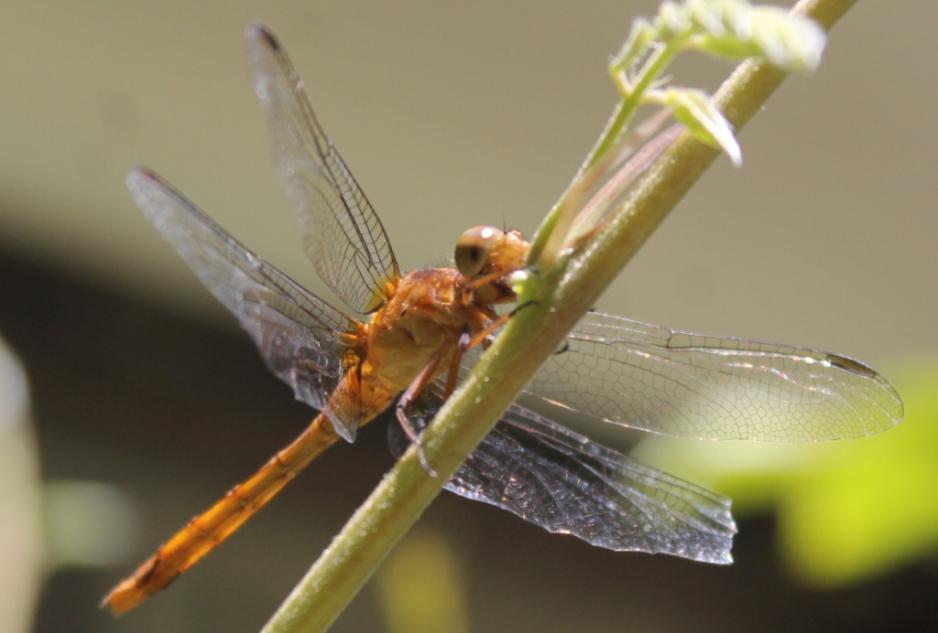 It was a beautiful morning, with a soft breeze just stirring the grass. Poised upon a swaying reed, Sir Dragonfly (for he was universally given his father's title) was watching with interest the movements of a shoal of Whirligig Beetles, who were darting about like bits of silver. But, in the meantime, being endowed with two pairs of eyes, a set on either side of their heads, they were well on the lookout for danger. Therefore, had Sir Dragonfly attempted to join their games, as he would have liked, that instant would have seen their departure, for they, also inhabitants of the water world, had been taught, like the rest, to fear him.
It was a beautiful morning, with a soft breeze just stirring the grass. Poised upon a swaying reed, Sir Dragonfly (for he was universally given his father's title) was watching with interest the movements of a shoal of Whirligig Beetles, who were darting about like bits of silver. But, in the meantime, being endowed with two pairs of eyes, a set on either side of their heads, they were well on the lookout for danger. Therefore, had Sir Dragonfly attempted to join their games, as he would have liked, that instant would have seen their departure, for they, also inhabitants of the water world, had been taught, like the rest, to fear him.
He was reflecting, rather miserably, upon this fact when a sudden blow nearly caused him to lose his balance. Glancing about to discover the reason, he was confronted by a laughing elf, who sat rocking upon the branch of a shrub growing close to the water's edge. He wore a suit of feathery red material, which, standing out in fine spikes, made his small body seem like a soft, silky brush.
'Do be careful,' said Sir Dragonfly, somewhat sharply, when he had settled himself again.
'I beg your pardon,' returned the elf, still laughing, 'especially as I came down to the creek this morning on purpose to find you. Would you like to know my name?'
'Well?' asked Sir Dragonfly.
'I am Callistemon, one of the Flower Elves, and my business is ? '
'To upset people who are trying to enjoy themselves,' muttered Sir Dragonfly.
'Oh, bother!' cried the elf, 'can't you let that alone? It was quite an accident, I assure you. I was about to say that my business is to keep these bushes that you see growing along the bank of the creek well covered with Red Bottle Brushes Aren't they pretty?'
And he held one up for Sir Dragonfly to admire.
'Really,' he went on, meditatively, 'I have a tremendous lot to do, because, as well as attending to the flowers, I am expected to look well after the wood of this plant. It is hard and heavy, and the Earthfolk sometimes use It for mallets, or axe and chisel handles, and for small work where they need great strength.'
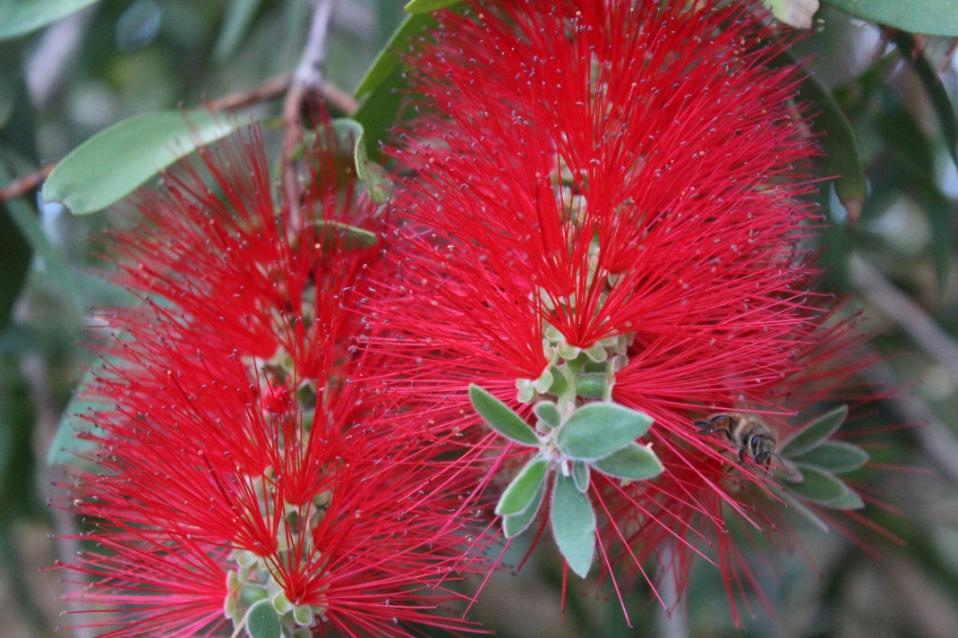
Callistemon
'Why did you come to look for me?' interrupted Sir Dragonfly, for whom the Earth folk and their doings had not the slightest interest; but whose curiosity as to the elf's visit had got the better of his annoyance, 'Have you anything particular to say?'
'I have.' And clasping his hands about his knees, the elf gazed at his questioner. 'You're not very happy, I am afraid, Sir I Dragonfly,' he began.
'I don't see that it concerns you whether I am or not,' was the answer, and the tone was snappish again.
'But, supposing I can help you?' asked the elf, good-humouredly.
Then, bending forward, he whispered in a mysterious tone, ''Wait, my friend, and, in a day or two, there will come to the creek one who, if I am I not very much mistaken, will charm away all your cares. Meanwhile, give up worrying about those stupid Insects. They are afraid of you, and always will be, I should imagine.’
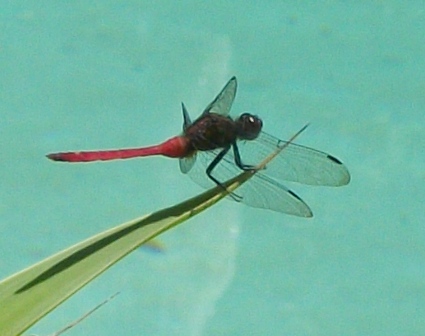 A few days later Sir Dragonfly was poised upon the self-same reed but now, everything else forgotten, he was eagerly awaiting the arrival of the promised visitor. To-day, the Butterflies called to him in vain, and the antics of the Whirligig Beetles were for once unheeded, as were also the inquisitive stares of a May-fly, who, with delicate, gauzy wings outspread, was taking his morning exercise. Then through the undergrowth appeared Callistemon, his face radiant with smiles. Beside him was the daintiest little fairy that Sir Dragonfly had ever seen, and, beholding her, he was chained to the spot with unbounded admiration.
A few days later Sir Dragonfly was poised upon the self-same reed but now, everything else forgotten, he was eagerly awaiting the arrival of the promised visitor. To-day, the Butterflies called to him in vain, and the antics of the Whirligig Beetles were for once unheeded, as were also the inquisitive stares of a May-fly, who, with delicate, gauzy wings outspread, was taking his morning exercise. Then through the undergrowth appeared Callistemon, his face radiant with smiles. Beside him was the daintiest little fairy that Sir Dragonfly had ever seen, and, beholding her, he was chained to the spot with unbounded admiration.
The elf, noting the look, was satisfied that things would end as he hoped. Often he had seen how lonely Sir Dragonfly was, and been sorry that he could find no way of helping him. Recently, however, he had hit upon an idea which he intended, if possible, to carry out successfully. What this was events will show.
Callistemon did not bring the fairy to where Sir Dragonfly was waiting. It seemed that she was bent on some errand of her own, and had no time to spare just then for introductions, for, nearing the water's edge, she left the elf, with a gay word or two, and was lost to sight among the bushes. Sir Dragonfly beckoned impatiently to Callistemon.
'Who is she?' he asked, when the elf bounded over to him.
'The Spirit of the Clematis,' was the reply. 'Lovely, isn't she? If you watch, you will see her again very soon.'
No need to urge Sir Dragonfly to a task so greatly to his liking. Day after day his eyes followed the graceful little sprite, as she flitted about beside the creek, covering the tops of the shrubs and small trees with a clambering vine, upon which grew masses of creamy bloom. And, where they mingled with Callistemon's brilliant flowers, the effect caused elf and fairy to clap their hands in glee at their own taste and skill.
Clematis
Sir Dragonfly applauded as heartily as they from a distance, for as yet the Flower Spirit did not seem to have observed his presence, and he had not dared to address her.
At last a chance came, though it proved a most unlucky one for Sir Dragonfly. Clematis, busy as usual, approached so near to the spot where her unknown admirer had placed himself, that, by leaning forward, he could almost have touched her. Seizing his opportunity, though with a beating heart, he began, in his most persuasive manner, 'Good-day, fair lady. May I have the honour ? ' But he got no further, for Clematis, looking up to see who the speaker might be, gave a terrified scream.
‘'Go away! go away! You'll sting me,' she exclaimed, and rushed off, calling loudly for Callistemon to aid her. At her entreaties the elf appeared, and, between the protests of the bewildered Dragonfly and the cries of the terrified Clematis, he had his hands full.
‘'Be quiet!' he said imperiously to the latter. 'No one will hurt you.' Then to Sir Dragonfly, 'I'm sorry, old fellow, but she must have heard the name that some of the Earth folk have given you, and it has made her afraid. They call you the 'Horsestinger.'
''But I don't sting,' cried Sir Dragonfly. 'I can't.'
'Of course not, but many of them think you can. I'll try to make Clematis understand, but it might be better for you to keep out of her sight for a while.'
Sir Dragonfly thereupon went to the far end of the creek, certain, beyond any doubt, that life was a failure, for the world seemed against him. The Insects whose goodwill he longed for shunned him persistently, the Earth folk tried to spoil his reputation, and because of that Clematis, upon whom he had been doing his best to create a good impression, regarded him with fear and dislike. Moodily he paused beside a small waterfall, which tumbled Importantly over the few rocks in its path with a musical plash. But suddenly It seemed to Sir Dragonfly that as it hurried along It murmured words, among which he could distinguish his own name. He listened intently, and this Is what he heard:
'Good luck attend your wooing, Sir Dragonfly. You wish that the Spirit of the Clematis shall be your bride, and your desire shall be granted. But the time has not come yet. Only those deserve to wed who have given proof of their valour, and this you have not done. When you have, Clematis shall be yours.'
Over and over again the message was repeated, until Sir Dragonfly, cheered and encouraged, moved away, feeling that all hope was not yet lost.
The days sped along. He did not again attempt to speak to Clematis, but, strange to say, she, on the other hand, had begun to take a curious interest in him, and several times Callistemon, who had assured her that on no account would Sir Dragonfly sting anyone, least of all herself, discovered her watching him thoughtfully.
It happened shortly that there came to the creek a stranger, who, spying our hero, made overtures of friendship, and Sir Dragonfly, glad to meet one of his own kind, for such the newcomer was, willingly responded. But this pleasant state of affairs was not destined to last long.
'See that plump little' Water Beetle,' said the strange Dragonfly next morning, as the two were twisting about in the air with the help of their great oar-shaped wings. ' I shall just be in time to catch him before he goes below again.'
'No, don't touch him,' exclaimed Sir Dragonfly hastily. 'There is food and to spare elsewhere. Here in this creek none of the Insects must be harmed.'
But the other gave a scornful laugh, and took no further notice, seeing which Sir Dragonfly sprang upon him as he was about to seize the unsuspecting Beetle, and a fierce contest began. Wildly the stranger fought, but he was no match for Sir Dragonfly, determined as the latter was to protect the denizens of the creek, and in a very short
time, having no fancy to be killed or injured for life, the other shook himself free, leaving his adversary triumphant.
And now the Water Insects, nearing of the combat, believed for the first time that Sir Dragonfly, however he might act towards others of their kind, would at least befriend those who dwelt in his native creek. Also the Spirit of the Clematis, concealed amid her vines, had witnessed his gallant behaviour, and, though she said nothing, ate thought a great deal. But evidently Callistemon read her thoughts, for he hurried away in search of Sir Dragonfly, whom he found resting upon the bank.
'I think,' said the elf with a sly smile, 'that if you care to seek Clematis now she will listen to all you wish to say.'
Toward the close of a lovely afternoon came the Friar Bird, flying over the tops of the trees, for he had been summoned to officiate at the wedding of Sir Dragonfly and Clematis. From end to end of the creek Callistemon had decked his bushes with a crimson glory, and the Spirit of the Wild Violet had woven a dainty carpet of blue and white for the bride's footsteps along the shelving banks. Many of the Butterflies were there, and all the Water Insects, happy and fearless. And Sir Dragonfly, as he gazed round upon the Assembly, felt his heart overflow with peace and joy — peace, now that he had succeeded in gaining the confidence of those who had for so long distrusted him, and Joy that he had wooed and won the fair Clematis for his bride. Sir Dragonfly. YOUNG FOLKS (1908, September 9). The Sydney Mail and New South Wales Advertiser (NSW : 1871 - 1912), p. 698. Retrieved from http://nla.gov.au/nla.news-article165397639
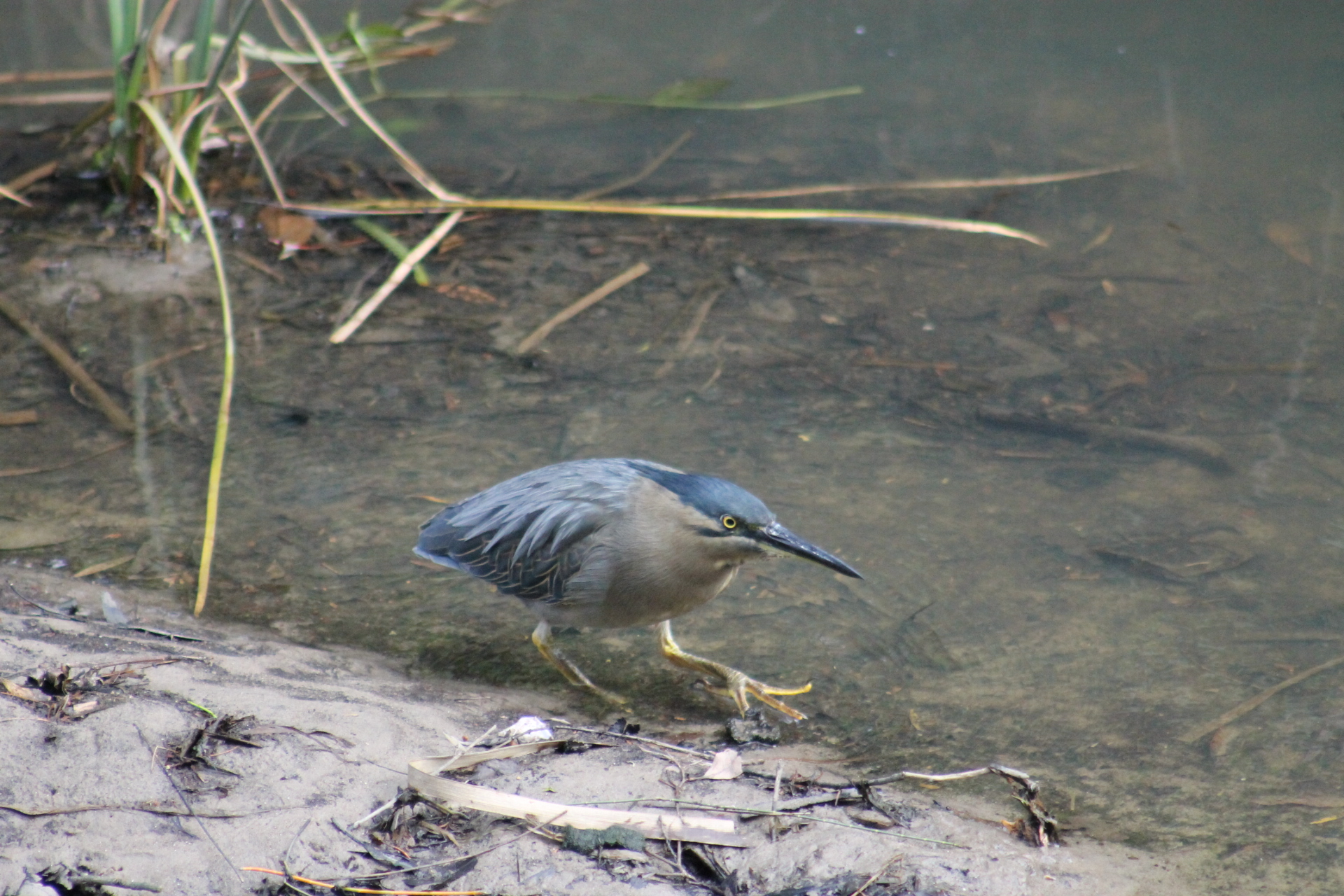 Mangrove or Striated Heron Butorides striata - in Careel Creek
Mangrove or Striated Heron Butorides striata - in Careel Creek